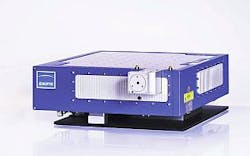Jenoptik femtosecond laser operates in the 30-200 kHz range
The JenLas D2.fs femtosecond laser features the company's diode-pumped disk laser technology, which provides parameter stability for industrial applications. With an operating temperature range of 15–35°C, the laser emits 40 μJ pulse energies at a 100 kHz repetition rate and operates in the 30–200 kHz range. Beam quality of M2 ≤1.25 near the theoretical limit coupled with pulse duration of ≤400 fs yields minimal heat effects in material processing applications.
Jenoptik Lasers & Material Processing
Jena, Germany
www.jenoptik.com
-----
PRESS RELEASE
Jenoptik’s Lasers & Material Processing Division: Femtosecond Laser for Optimal Application in Industry
The new femtosecond laser JenLas® D2.fs is another product from the Jenoptik laser range. Based on the diode-pumped disk laser technology, this laser provides outstanding parameter stability and defines a new standard in laser sources of the femtosecond class. Developed for application in industrial environments, the working temperature range was extended to 15–35 °C. The laser emits high pulse energies of max. 40 μJ at 100 kHz repetition rate and can operate in the 30-200 kHz range. The beam quality of M² ≤ 1.25 near the theoretical limit, together with pulse duration of ≤ 400 fs opens new laser applications in industry.
To ensure industry capability, every laser is subjected to strict type tests to guarantee safe function under typical conditions of transportation, storage and operation. This includes climate and shock tests, noise immunity to external electrical noise and compliance with the low EMC standards for electrical noise emission. Major features include ease of integration of the turn-key laser in complex machines and plants. For example, the actuation signal can be released by software or hardware.
Due to the specific properties of the impact of ultra-short femtosecond laser pulses on different materials, new laser applications can be found. For example, these laser pulses are excellent for all material processing applications for which minimal heat effects during processing are important. Another area includes processing inside of transparent materials, such as glass, transparent plastics and transparent function layers. A third and final field of application is the selective ablation of individual layers in multiple-layer systems consisting of different materials.
Concrete industry applications in these areas include the 3D-micro material ablation of metal or polymer (e.g., cutting of stents), thin layer ablation in the semiconductor industry or the removal of dielectric layers on crystal solar cells in photovoltaics. Other applications are the scribing of sapphire substrate, the processing of dental ceramics and the internal marking of glass.
-----
Subscribe now to Laser Focus World magazine; it's free!
